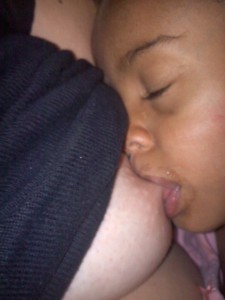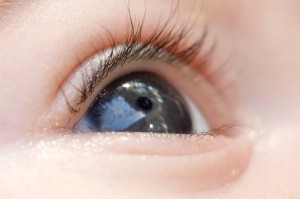I didn’t think much about parenting before I became a mom, but when it came to breastfeeding, there was never a question in my mind that we would nurse.
From the moment she latched on, I knew we would be doing this for a long, long time.
And so, on the week of her first birthday, when I found out I needed to have a biopsy for a polyp in my sinuses, I was horrified because the anesthesia would mean we would need to pump and dump my milk for a few hours. Even more alarming was my doctor’s insistence that the medication I would need to help whatever was going on would require me to wean.
On my drive home from that doctor’s visit, all I could think about in the car was having to wean Kaylee. And how that wasn’t going to happen anytime soon.
When I walked in the door and screamed for my mom, I expected the words out of my mouth to be about weaning Kaylee.
“I may have cancer.” Came crying out as I held my mother tighter than I had before. And I realized that there was much more at stake than nursing.
Two days later, I awoke from surgery and heard the news, suddenly weaning was not in my mind as much as living. And as I watched my daughter open her birthday presents that weekend, I could only hope to see her do the same at Christmas. Just a few short months away.
The next week, I had my first appointment at Sloan Kettering. It was on the 9th floor with the other pediatric patients.
I had Kaylee with me. I had been nursing her frantically. The only time I could maintain any sense of calm was during that beautiful time we shared.
One that I knew was going to end soon.
During the appointment, I was given my options for treatment.
I faced the most difficult decision of my life.
And I chose to give up a year of my life, to save the rest.
But it wasn’t just my life, it was the life of my little girl.
She who would need to go from sleeping by her mothers side and nursing on demand to having a mother who was rarely around.
We had a week to wean before treatment began.
My first thought was to let her nurse as much as possible, even encourage it. Let her enjoy it while it lasted.
But, it just didn’t sit well in my heart. She was only 1. I couldn’t tell her what was happening. It seemed more cruel to go from more than enough to nothing.
I changed tactics. When she came over to nurse, I would offer a hug and a smile. Tell her I love her and act as if that was all I needed as well.
And she was okay with the hugs. She stopped asking to nurse after a day.
Nighttime was a different story.
I didn’t have it in me to try to stop. She was still up every 2 hours and I was not in a place to try to get that to stop with so little time. Sleep was hard enough as it was!
And so, the night weaning was like ripping off a bandaid. Where I was the bandaid, and just like that, I was taken away and it was up to my daughter and her father to get through those first milkless nights.
I was weaning on my own.
Pumped milk is like gold. A precious commodity, you don’t want to lose a drop.
But my pumped milk was poison. With toxicity so great, I felt guilt every time I poured it down the drain.
Unable to fight any infection in my body, I had to be sure to pump milk regularly, because any plugged duct had the capability of endangering my life. At the same time, I had to get my breasts to stop making milk.
And so, it was a delicate balance. A tedious process that was draining physically and mentally.
In time, the milk was gone.
I think back to those first few weeks.
The diagnosis. Leaving home. Being sick.
And out of all the traumas of that year, its this experience.
Of pumping and dumping.
Of being scared to sleep with my child for fear she would start nursing.
Of weaning. Too early and too abruptly. Of having the experience last for weeks with every drop of milk that went down the drain.
And perhaps that is because its just not something anyone spoke about. Everything else seemed so big, weaning was just an aside.
And yet, the pain and heartbreak were tremendous.
Perhaps I will be graced with another child someday. A child that will wean gracefully. A child that will have their mother during their second year of life. A child who has happily married, healthy parents.
And that is a lovely, heartwarming thought. One that brings tears to my eyes.
But thats not what I need. And that life is not any better than Kaylee’s life.
Children don’t need to be protected from experiencing life. They need to be given the tools to help them get through it.
Kaylee is okay.
She is more than okay, she is incredible.
Well spoken, creative and compassionate. She is the walking example that all you need is love.
I wouldn’t take away any of her experiences regardless of how awful they may have been. They are hers to have had.
We spend a lot of time worry about messing up our kids.
Those traumatic experiences they encounter that we could have prevented.
The times we lose our cool and let our anger get the best of us.
We neglect ourselves trying to get it right.
Obsessing about the day to day encounters and experiences.
But its not our job to be perfect. Its not our job to make our children’s lives easy. Nor is it our job to push ourselves beyond healthy limits and boundaries because we are scared.
Its our job to Love. To give compassion. To teach and guide.
To forgive ourselves and others so that our children can too.
Whatever worry you have on your mind. Whatever struggle at the moment. Its going to be okay. Your child is going to be okay. The experiences and traumas we encounter cultivate who we become.
And when we are given love we become love and thats all any of us need.






